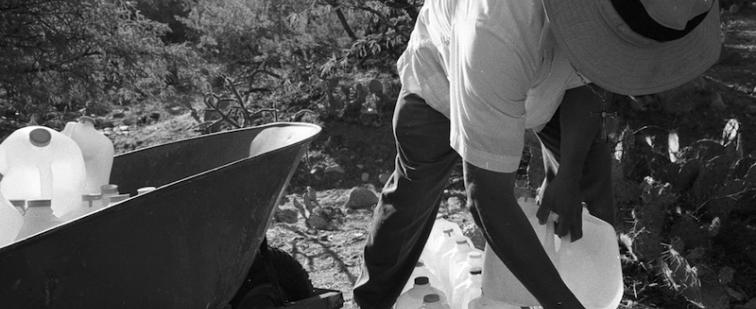Home
The Madeira River in western Brazil is the Amazon's longest tributary and one of the best-preserved tropical waterways and jungle corridors in the world. A project for two massive dams on its remote upper reaches has long been a matter of controversy, not only among environmentalists, but also among Brazilian technocrats unsure of the risks.
The unequal relationship between the U.S. and Puerto Rico is perceived by some as an anachronistic remnant of the colonial era. The current status of Puerto Rico, an unincorporated territory of the U.S., allows the federal government to unilaterally impose a range of measures on the island without enfranchising the people to have a voice in the legislative process.
Last year, when residents in Santa Eduviges entered their second month without running water, everyone knew something had to be done. A town assembly was called. Community members expressed outrage that the water company’s $7 per month bill always arrived on time, but taps barely flowed. When they did, the liquid that came out was an ugly brown.
Last year Sérgio Cabral, governor of Brazil’s Rio de Janeiro State, praised the Colombian government’s success in reducing violence in Bogotá. Formerly one of the most dangerous cities in the world, Bogotá has seen a dramatic decrease in violent crime rates in the last five years. Cabral announced that he intended to transplant the Colombian model to Rio de Janeiro, but he has since changed his mind. Bogotá’s new urban order, he may have realized, resulted not from the rule of law, but from the rule of private right-wing militias.
Thanks to over a decade of international campaigns, many U.S. consumers know most of their clothes are made in developing world assembly plants known as “maquilas” that routinely violate workers’ rights. Pointing out the abusive and illegal conditions at these factories is often met with the following matter-of-fact rebuttal: “These are poor countries. For them, a bad job is better than no job at all.” In the case of Nicaragua, this statement generally rings all too true.
In the context of the ongoing para-politics scandal in Colombia, which has undermined the legitimacy of the right-wing government, the left is rapidly emerging as the new political force in the country. Colombia’s largest leftist guerrilla insurgency, the Revolutionary Armed Forces of Colombia (FARC) has been waging a war against the State for more than 40 years. But for the first time since the 1980s, a left-of-center political party is gaining prominence on both the local and national level, illustrating that Colombia is not immune to the electoral shift to the left that is occurring throughout the region.
After more than 20 years of waiting, communities in the highlands of Guatemala are finally able to bury their loved ones—victims of some of the most brutal violence of the country's 36-year civil war. After an arduous process of gathering testimonies, finding the mass graves, and exhuming the bodies, villagers hope the dead will finally be able to rest in peace.
Portraits taken during the inhumation process described in "The Martyrs are Home." The people pictured reside in the communities of Juá, Chel and Xaxmoxan, in the municipality of Chajul. The region is predominantly inhabited by the Ixil Mayan ethnic group.
As Rio de Janeiro prepared to host July’s Pan American Games, the largest sporting event in the hemisphere, private paramilitaries occupied favelas near two of the city’s main highways, in an apparent effort to impose security near crucial tourist infrastructure. A NACLA investigation, supported by the Samuel Chavkin Investigative Journalism Fund, finds that for many favela residents, the militias are little better than the gangs or corrupt police they have replaced.
The launch of the Bank of the South is an ambitious and strategic gambit in regional integration, one that could result in a truly regional development bank. Despite Brazilian concerns, this new institution is ready to be launched.












